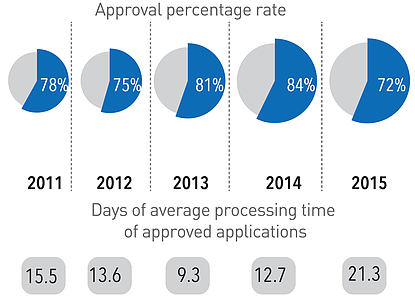Decline in approval of permits for national staff working with international organizations to leave/enter Gaza
Constraints also imposed by the de facto authorities on these staff
 Approval rates for permit applications for national staff working with international organizations (UN and INGO) to exit and enter the Gaza Strip have decreased significantly in 2016. Of the 128 local staff members (mostly UNRWA) who submitted an application in January, 119 permits were granted, an approval rate of 93 per cent. This declined to 83 per cent in February (53 approvals from 64 applications), to 57 per cent in March (35/62), before declining significantly to only 24 per cent in April (18/74). For the past five years, the annual approval rate has varied between 72 and 84 per cent.
Approval rates for permit applications for national staff working with international organizations (UN and INGO) to exit and enter the Gaza Strip have decreased significantly in 2016. Of the 128 local staff members (mostly UNRWA) who submitted an application in January, 119 permits were granted, an approval rate of 93 per cent. This declined to 83 per cent in February (53 approvals from 64 applications), to 57 per cent in March (35/62), before declining significantly to only 24 per cent in April (18/74). For the past five years, the annual approval rate has varied between 72 and 84 per cent.
Of additional concern, in April only 19 per cent (17/74) of total permit applications were approved for the length of time requested compared to 23 per cent in March. A further five per cent (4/74) of permits were approved for a shorter duration than requested, predominantly applications for three-month permits that were approved for only one month, or for as short a period as one week. Although significantly lower than the equivalent figure for March, 34 per cent (21/62), this is partly attributable to the significant increase in the rate of permits denied in April (35 per cent vs. 21 per cent in March). The number of permits still pending at the end of April, 39 per cent, is also higher than the equivalent for March which was 30 per cent. There were also 4 cases of approved permits being confiscated from staff while at the Erez crossing. No confiscations were reported in April; however this is partly a result of reduced permit approval rates and the resulting reduction in travel UN Gaza national staff.
These restrictions on national staff hamper the ability of humanitarian organizations to provide assistance and protection to Palestinians in Gaza. Since July 2015, citing security reasons, the Israeli authorities have prohibited UN and INGO staff who are Palestinian citizens of Israel from entering Gaza, and only urgent cases of East Jerusalem residents have been approved.8 Prior to these restrictions, an average of 170 permit applications per year were submitted by UN agencies and INGOs for these two categories. The operating space for organizations providing assistance inside Gaza has also been under strain over recent months from the de facto authorities in Gaza who have limited the movement of staff and access to certain areas, citing security concerns.









